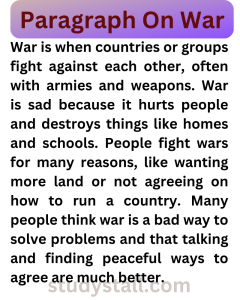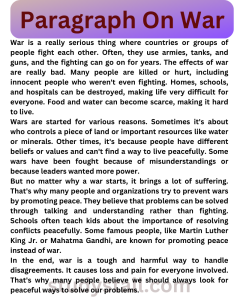War is a concept that has shaped the course of human history, leaving behind a trail of destruction, loss, and suffering. It is a phenomenon that involves armed conflict between nations or groups, often driven by political, economic, or ideological motivations. In this article, we will explore the various aspects of war, its impacts, and the efforts made to prevent and resolve conflicts.
Paragraph On War 100 words
War is when countries or groups fight against each other, often with armies and weapons. War is sad because it hurts people and destroys things like homes and schools. People fight wars for many reasons, like wanting more land or not agreeing on how to run a country. Many people think war is a bad way to solve problems and that talking and finding peaceful ways to agree are much better.
Paragraph On War 200 words
War is a conflict where often one group or country wants to beat another. This usually involves armies and lots of fighting. Wars can last for a very long time and cause a lot of pain and loss. People get hurt, and many die. Buildings get destroyed, and children can’t go to school. Sometimes, people have to leave their homes and become refugees in other places.
People start wars for different reasons. Sometimes, they can’t agree on who should be in charge, or they fight over land or resources like oil. Some wars happen because people hate each other based on things like religion or race. But whatever the reason, war is a hard and painful way to solve problems. Many people believe that talking, negotiation, and understanding are better ways to fix disagreements.
Paragraph On War 300 words
War is a really serious thing where countries or groups of people fight each other. Often, they use armies, tanks, and guns, and the fighting can go on for years. The effects of war are really bad. Many people are killed or hurt, including innocent people who weren’t even fighting. Homes, schools, and hospitals can be destroyed, making life very difficult for everyone. Food and water can become scarce, making it hard to live.
Wars are started for various reasons. Sometimes it’s about who controls a piece of land or important resources like water or minerals. Other times, it’s because people have different beliefs or values and can’t find a way to live peacefully. Some wars have been fought because of misunderstandings or because leaders wanted more power.
But no matter why a war starts, it brings a lot of suffering. That’s why many people and organizations try to prevent wars by promoting peace. They believe that problems can be solved through talking and understanding rather than fighting. Schools often teach kids about the importance of resolving conflicts peacefully. Some famous people, like Martin Luther King Jr. or Mahatma Gandhi, are known for promoting peace instead of war.
In the end, war is a tough and harmful way to handle disagreements. It causes loss and pain for everyone involved. That’s why many people believe we should always look for peaceful ways to solve our problems.
Paragraph On War 500 words
Causes of War
Wars can arise from a multitude of causes, ranging from territorial disputes to religious or ethnic differences. Oftentimes, conflicts emerge due to a clash of interests between nations or groups, with each party vying for power, resources, or influence. Economic factors, such as competition for strategic resources or trade routes, can also ignite tensions that eventually escalate into armed conflict.
Moreover, ideological differences have played a significant role in triggering wars throughout history. Conflicting political systems, religious beliefs, or social ideologies have driven nations to engage in warfare to defend their values or impose them upon others. These underlying causes, coupled with historical grievances and unresolved conflicts, create a powder keg that can erupt into full-scale war.
Impacts of War
The impacts of war are far-reaching and devastating, affecting not only the combatants but also innocent civilians caught in the crossfire. Human lives are lost or forever altered, infrastructure is destroyed, and economies are shattered. Societies are torn apart, leaving behind deep scars that may take generations to heal.
- Loss of life: War results in the tragic loss of both military personnel and civilians. Lives are cut short, families are torn apart, and communities are left grieving.
- Physical destruction: The destruction caused by war is often immense. Buildings, infrastructure, and cultural heritage sites are reduced to rubble, disrupting the social fabric of communities.
- Displacement: Wars force people to flee their homes, leading to mass displacement and the creation of refugee crises. Displaced individuals face numerous challenges, including lack of access to basic necessities, heightened vulnerability to violence, and uncertain futures.
- Economic turmoil: War disrupts economies, leading to widespread poverty, unemployment, and inflation. Resources that could have been allocated towards development and growth are instead diverted towards military endeavors.
- Psychological trauma: The psychological toll of war is profound. Survivors and witnesses often suffer from post-traumatic stress disorder (PTSD), anxiety, depression, and other mental health issues.
Efforts to Prevent and Resolve Conflicts
While war has been a recurrent feature of human history, efforts have been made to prevent and resolve conflicts peacefully. International organizations, diplomatic negotiations, and treaties have been crucial in fostering peace and stability.
- Diplomacy: Diplomatic negotiations serve as a key tool in preventing and resolving conflicts. Diplomats engage in dialogue, mediation, and negotiation to find peaceful solutions that address the underlying causes of disputes.
- International organizations: Organizations such as the United Nations (UN) play a crucial role in maintaining peace and security. Through initiatives like peacekeeping missions, humanitarian aid, and conflict resolution mechanisms, the UN strives to prevent wars and promote peaceful coexistence.
- Treaties and agreements: International treaties and agreements serve as binding commitments between nations, establishing norms and regulations to prevent armed conflicts. Examples include the Geneva Conventions, which outline the rules of warfare, and nuclear non-proliferation treaties.
- Conflict resolution mechanisms: Various mechanisms, such as international courts and arbitration, facilitate the resolution of disputes between nations or groups. These processes aim to provide impartial judgment and promote reconciliation.
- Education and advocacy: Promoting peace education and advocating for non-violence are vital in preventing conflicts. By fostering understanding, empathy, and tolerance, societies can work towards a more peaceful world.
In conclusion, war is a destructive force that reshapes the lives of individuals, communities, and nations. The causes of war are complex and multifaceted, ranging from territorial disputes to ideological differences. The impacts of war are widespread and devastating, affecting both combatants and innocent civilians. However, efforts to prevent and resolve conflicts have been made through diplomacy, international organizations, treaties, conflict resolution mechanisms, and education. It is our collective responsibility to strive for peace and work towards a world where war becomes a thing of the past.
FAQ:
- What are the causes of war?
- Wars can arise from a multitude of causes, ranging from territorial disputes to religious or ethnic differences. Conflicting political systems, religious beliefs, or social ideologies have driven nations to engage in warfare to defend their values or impose them upon others.
- What are the impacts of war?
- The impacts of war are far-reaching and devastating. They include loss of life, physical destruction of infrastructure and cultural heritage sites, displacement of people leading to refugee crises, and economic turmoil.
- How does war affect human life?
- War results in the tragic loss of both military personnel and civilians. Lives are cut short, families are torn apart, and communities are left grieving.
- What are the economic consequences of war?
- War disrupts economies, leading to widespread poverty, unemployment, and inflation. Resources that could have been allocated towards development and growth are instead diverted towards military endeavors.




